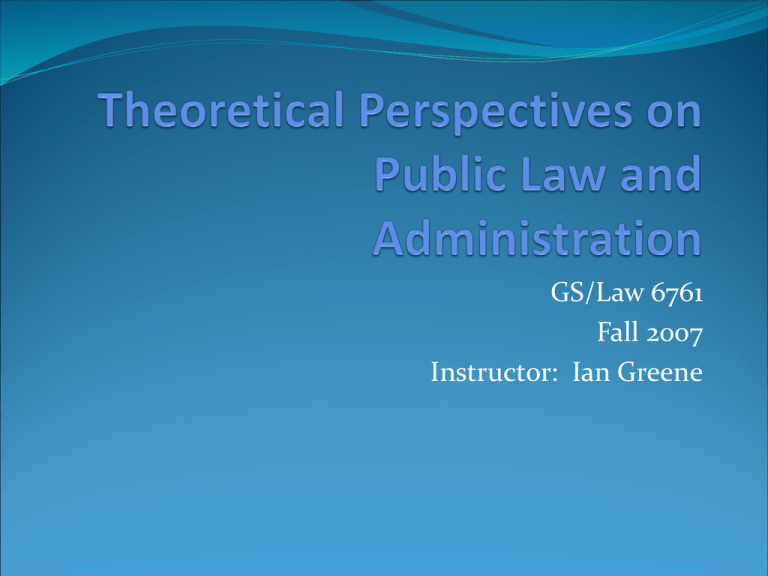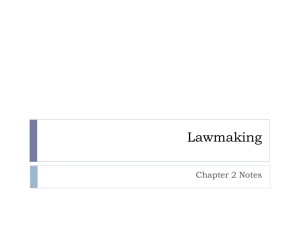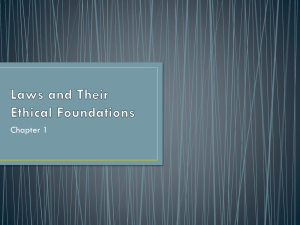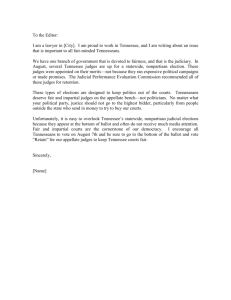Theoretical Perspectives on Public Law and
advertisement

GS/Law 6761 Fall 2007 Instructor: Ian Greene Preliminary Matters Introductions Origin of this course: Justice John Evans Evaluation Presentations My own background Grew up in a small Alberta town (population 1000) Attended the U of Alberta (Edmonton), and did a student exchange to Bishop’s University (Sherbrooke, Quebec) during 2nd year Majored in political science Wanted to be a lawyer BUT got a scholarship for an MA at U of T MA in Political Science at University of Toronto: loved political science study of courts Post MA Traveled around the world for 2 years: New Zealand, Australia, Indonesia, Singapore, Malaysia, Thailand, Burma, India, Nepal, Pakistan, Afghanistan, Iran, Turkey, Europe Accepted to law school, but decided to do a Ph.D. first. Studied the causes of unreasonable delay in courts Theory: we didn’t understand the proper relationship between judicial independence and ministerial accountability What I found: friction, misunderstanding, and “passing the buck” amongst judges, lawyers, crown attorneys and court administrators is the major cause of unreasonable delay British Columbia & Alberta Worked for Alberta gov’t for 4 years Assistant to a cabinet minister 1 year Middle manager in Alberta Social Services 3 years First teaching job: College of the Rockies in Columbia Valley, BC My family York University Years Research on judicial behaviour & ethical politics The Courts (2007) A Question of Ethics (2006) Honest Politics (1998) Final Appeal (1998) Judges & Judging (1991) The Charter of Rights (1988) Teaching For next 4 years will teach mostly graduate courses Director of Master of Public Policy, Administration & Law Program Co-Coordinator of part-time LLM in Administrative La Master of McLaughlin College You’re invited to College events – eg. Joe Clark speaking on Thursday, November 15, 5 p.m., 014 McLaughlin A.V. Dicey Albert Venn Dicey - British jurist (1835-1922) Oxford graduate & later professor & Oxford & London School of Economics Introduction to the Study of the Law of the Constitution – 1885 Refined idea of “unwritten constitution” Constitutional conventions (generally recognized as mandatory practices – monarch should dismiss a government that clearly breaches a convention) Responsible government: cabinet responsible to legislature, cabinet solidarity, ministerial accountability Basic principles of British constitution: Parliamentary (legislative) Sovereignty Distinct from U.S. system of separation of powers The rule of law (law applies equally to everyone unless exceptions written into the law) No need for a British bill of rights: judges who apply the rule of law properly safeguard human rights far better than having to apply a rigid bill of rights Judicial independence Parliamentary supremacy means that the legislature determines the jurisdiction & organization of courts, but once appointed, judges are independent as protected by the Act of Settlement, 1701 Act of Settlement Superior court judges appointed “during good behaviour” (security of tenure), and their salaries are “established” by Parliament (not the cabinet) (In Canada, Valente (1985): -security of tenure (judges can’t be removed except as recommended by an inquiry that conducts a fair hearing) -salaries must be set by legislature and high enough to discourage bribery -judges control those aspects of court administration that directly affect adjudication Parliamentary Supremacy vs. Separation of Powers U.S. constitution of 1787 recognizes “separation of powers,” not legislative supremacy. Why? Fathers of U.S. constitution read Montesquieu (~1750) who argued that the British protected their liberty through a separation of powers. But British government was evolving toward parliamentary supremacy and responsible government Dicey argued that separation of powers meant judicial supremacy. British unwritten constitution infinitely superior. British system vs. French Common law system ensures that all courts and administrative tribunals are supervised by superior court judges, who ensure liberty through properly applying the rule of law. The French and other civil law jurisdictions have separate administrative law courts. This can lead to abuse of power. Common law system is infinitely superior to civil law systems, and the British common law system is infinitely superior to the American common law system Alan Cairns “The past and future of the Canadian administrative state.” Yong Wang Alan Cairns – one of Canada’s best-known political scientists Born in Ontario B.A. in 1953 and M.A. degree 1957 from U of Toronto Member of the Department of Political Science at University of British Columbia from 1960 -- 1995 and served as head of the department from 1973 to 1980. Evans, Janisch, Mullan & Risk Administrative Law text, Introduction Raj Sharma Martin Loughlin Public Law and Political Theory Guy Brownlee Prof. of Public Law, London School of Economics Alberta provincial lawsuit settled Ian Greene Assured Income for the Severely Handicapped Administrator in Southern Alberta, 1983-85 Rule of law issue John Locke The Second Treatise on Civil Government [1690] Judy Verbeeten John Stuart Mill (1806-1873) On Liberty [1859] (worked for Br East India Co until 1858) Trudy McCormick Peter Hogg Constitutional Law of Canada Alia Ahmed Hutchinson & Monahan “Democracy & the Rule of Law” Hillary Cameron Greene, Baar, McCormick, Szablowski, Thomas Final Appeal (1998) Ipperwash Inquiry Leanne Briscoe Stephen Brooks Karey Lunau Professor, U of Windsor; B.A., M.A. (Windsor), Ph.D. (Carleton) Harry Arthurs “Without the Law: Administrative Justice and Legal Pluralism in 19th Century England” Ian Greene



